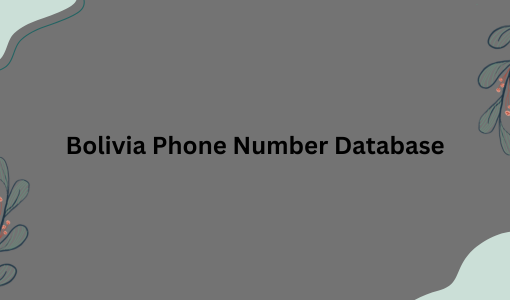To buy an Italy phone number list-one that contains 3 million entries. For example-one would have to be very sensitive about privacy laws. However, Regulations. And ethical guidelines. Being a member of the European Union. Italy enforces the General Data Protection Regulation. More popularly known as GDPR; this regulation seeks to guarantee security of personal data identifying an individual. Which even involves their telephone number. Without compliance. Such a list would be too much of a risk to utilize. Considering the high chances of legal repercussions. Fines. And reputational damage. Below is an Italy step-by-step guide regarding legal and ethical considerations when purchasing and using lists of telephone numbers.
Legal Considerations
1. General Data Protection Regulation (GDPR)
As a member state of the EU. However, Italy is bound by one of the most rigid data Italy Phone Number List protection laws in the world: the General Data Protection Regulation. However, Commonly referred to as the GDPR. However, This regulation outlines how personal data. Including phone numbers. Should be treated. However, Following is what focuses on the critical points of the GDPR relevant to phone number acquisition:
Legal Basis for Processing: Collection and usage of such personal information as a phone number are to be based on the law. However, Several lawful bases are provided for in the GDPR. Which presumes that data shall not be processed unless one of the following bases exists. Including:
Consent: The contact should
By an express agreement. Allow the collection of their phone number for specific purposes. However, Such as marketing or service communication.
The contractual necessities also work in cases where it is essential to have a phone number. However, For example However, . For the performance of a contract in the delivery of product or service.
Legitimate Interest: Companies can process personal information in the interest of a business. However, But this should be on a balance between such legitimate interest and the right to privacy of the individual. These include reaching out or Buy Email Database List retaining customers but cannot affect the rights of an individual.
Principals of Transparency and Accountability: An organization must be transparent as to when personal information is and how it is However, This means individuals should be informed about their rights. How their information should be t. And with whom that information is . Privacy policies to be understandable and accessible.
Rights of the Data Subject
GDPR grants rights to the data subjects in respect of their personal data. Such as the right to access. However, Rectification. Erasure. And restriction of processing. Businesses need to make sure that they have mechanisms in place to enable these rights.
2. Italian Data Protection Law
Apart from the GDPR. Italy has its Personal Data Protection Code. Supplementary to the GDPR but with particular recommendations on how personal information is treated inside the country. The Garante per la protezione dei dati personali is an Italian Data Protection Authority that lays down the law and sees to its being kept to.
3. Telemarketing Regulations in Italy
Telemarketing in Italy follows the provisions of the GDPR and the Italian Privacy Code. With particular provisions regarding telemarketing calls. Some of the important regulations include:
No Cold Calling List
Italy maintains a “Registro delle Opposizioni” or a register to which citizens can oppose receiving marketing calls. This list shall be checked by businesses prior to any marketing call so as not to call those who have opted out.
Consent for Marketing Communications: A business cannot make telemarketing calls without the prior consent of the concerned person. The consent has to be provided freely. Without any detriment. In a specific. However, Informed. And unambiguous manner. Without obtaining the consent. No calls with marketing communications can be made to the individual by a business.
Opt-out Requirements: Each marketing message must provide an opportunity for an individual to opt out of future communications. Where a request for opting out is receiv. Under the law. A business must refrain from continuing to contact him for marketing purposes.
4. Risks of Using Purchased Phone Number Lists
Legal Implications: Purchasing or using a list of phone numbers without properly seeking the consent of contact persons may lead to substantial fines and serious legal consequences. Violations under the GDPR can attract fines up to a maximum of €20 million or 4% of global turnover. Whichever amount is greater.
Reputational Damage: Breach of privacy legislation results in serious reputational damage. There is a growing concern by consumers regarding the handling of their data. And misuse of personal data by businesses results in lost consumer trust and loyalty.
Inaccurate Data
Many purchas lists of telephone numbers are out-of-date or inaccurate. However, The eventual effect of misusedata includes wast marketing efforts. Poor customer targeting. And consequently poor business performance.
Unsolicited Calls: Businesses could be fin for failing to adhere Bulk Database to the telemarketing restrictions. This could be in the form of calling people whose phone numbers are on the Do Not Call list or marketing calls to subscribers where permission has not been sought in advance to make those calls.
Ethical and Legal Means of Getting a Phone Number
Permission-Based Marketing: Permission- marketing still is the most ethical and compliant means through which one acquires a phone number. This includes:
Customer Sign-Ups: When people call to sign up for services. Newsletters. However, Or any form of promotional offer. Gather phone numbers. Always make sure consent is explicitly given and a person knows how their data will be us.
Lead Generation: Give value against
Contact information with discount offers. Free content. However, Or survey participation.
Surveys and Polls: this is when an individual is involv in providing their phone numbers with the aim of giving customer feedback or on a market research basis. Where clients are well informed on the basis of their data usage.
Verified Data Providers: Companies neing larger contact lists may buy data from such verifi and compliant data providers. However, Such data providers ensure that the phone numbers provided are dulywith explicit consent and that the data s is in conformance with both GDPR and Italian law. Where there is to deal with such data providers. Businesses should ensure due diligence on their compliance status under the relevant law.
Public Directories: Sometimes
Phone numbers could be accessed with public directories; nevertheless. The business should also be concerned about telemarketing compliance. They will need to check if the person has opted out of marketing calls.
Conclusion
The obtaining and usage of a database of phone numbers in Italy with 3 million entries is indeed not easy because complex frameworks surround this. However, The legitimacy of any company is not to be on the receiving end of these legal penalties. However, Which can also bring serious harm to one’s reputation. Not calling those who have opted out. And transparency with security of data according to the GDPR and Italian law on privacy.
The best way to get phone numbers is through
Permission-based marketing. However, People will provide the contact information themselves. However, Otherwise. Any company can get in touch with verified data providers that take all measures to comply with the laws on privacy. Businesses must be sensitive to the people’s right to privacy and must adhere to any legal standards. It will keep a healthy relation with customers and also avoid the legal risks of data mismanagement.



